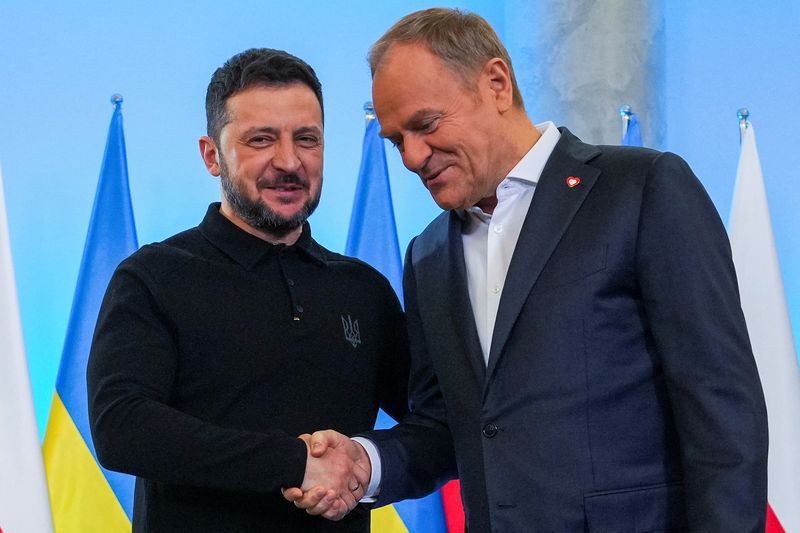By Barbara Erling, Yuliia Dysa and Jan Strupczewski
WARSAW (Reuters) -Poland on Tuesday hailed progress in resolving a historical dispute with Ukraine and said Warsaw would work to speed its neighbour's progress towards the European Union in talks with President Volodymyr Zelenskiy which also covered arms supplies.
Although EU-member Poland has been one of Ukraine's staunchest backers since Russia invaded in 2022, ties between the neighbours have been strained for generations by the Volhynia killings that took place from 1943 to 1945.
The issue has become even more heated in recent years and will feature in the campaign for a presidential election in May, in which the main nationalist opposition candidate is the head of the National Remembrance Institute (IPN).
Deputy Prime Minister Wladyslaw Kosiniak-Kamysz said in October that Ukraine would have to resolve it in order to join the European Union.
"We are finding a common language when it comes to the issue of the Volhynia crime," Polish Prime Minister Donald Tusk told a joint news conference with Zelenskiy. "We will work towards a systemic solution to this problem".
Zelenskiy said that the allies must "move forward in our relations".
On Friday, Tusk had hailed a "breakthrough" in ties, saying that Ukraine had made a decision to allow the first exhumations of victims to take place.
Polish daily Rzeczpospolita reported that work on exhumations was scheduled to begin in April.
Poland says more than 100,000 Poles were killed in the massacres by Ukrainian nationalists. Thousands of Ukrainians also died in reprisal killings.
Warsaw has long demanded free access to sites where those killed are believed to have been buried, so that they can be exhumed for proper funerals.
EU PRESIDENCY
Poland took up the rotating presidency of the Council of the European Union this month, with bolstering the bloc's security and commitment to Ukraine high on the agenda as leaders look ahead to Donald Trump's inauguration as U.S. president.
Tusk said that Poland would work to speed up Ukraine's accession to the bloc during its six-month presidency.
Ukraine, which faces a Russian push along front lines, has also requested more weaponry.
"We discussed today our defence, arms supplies, and weapons production," Zelenskiy said. "We talked about the appropriate investments, which we need so much, without which it is very difficult to hold the frontline," Zelenskiy said.
Ukraine produces 33-34% of all weapons domestically, Zelenskiy said.
MASSACRES
The area where the massacres took place, which was inhabited by both Poles and Ukrainians, was part of Poland before World War Two before being occupied by the Soviet Union.
In 2013, the Polish parliament recognised the massacre by the Ukrainian Insurgent Army (UPA) during World War Two as "ethnic cleansing bearing the hallmarks of genocide".
Ukraine has not accepted that assertion and often refers to the Volhynia events as part of a conflict between Poland and Ukraine that affected both nations.

Kyiv has said that Poland mistreated Ukrainians on its territory after the war by forcibly relocating them to other parts of the country. It also complained about the vandalism in 2015 of a monument to Ukrainian nationalist soldiers in Poland.
Ukrainian Foreign Minister Andrii Sybiha said in an interview with European Pravda published on Wednesday that Kyiv demanded worthy commemoration of Ukrainian burials on the territory of Poland as part of a resolution.